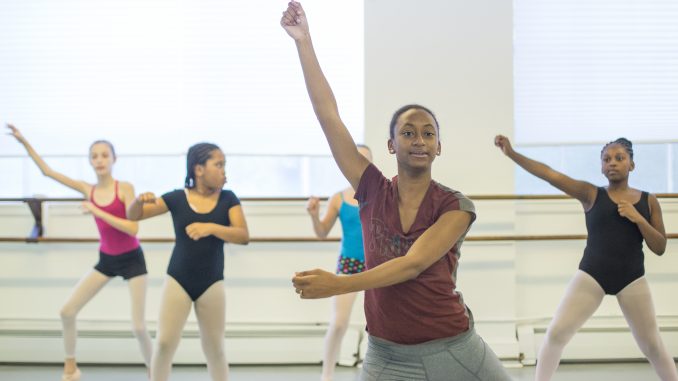
Nancy Malmed thinks liberal arts programs have been neglected in Philadelphia public schools for far too long—and the situation is getting worse.
As one of the first alumna of Temple’s dance program in 1970, she has spent her life studying and performing various dance genres, with a passion for traditional Russian-style ballet.
For Malmed, classical ballet inspired her dedication to sustain children’s dance education. Throughout her career, she has seen schools cut performing arts programs and even close down altogether.
She believes public schools in Philadelphia have continually underserved their students with these administrative decisions and budget cuts.
“They have a certain amount of money and they prioritize how they want to use it,” Malmed said. “Arts has always been the orphan—it’s always getting cuts.”
As executive director, Malmed helped establish the nonprofit International Ballet Exchange, abbreviated as IBE. The program provides dance classes to students in Philadelphia.
Through its for-profit sister school Wissahickon Dance Academy at 38 E. School House Ln., IBE works with elementary and high schools every year to incorporate students in performances with the Donetsk Ballet, a world-class dance company.
In 1993, Malmed took a group of students to the city of Donetsk—a present day war-zone—for a two-week ballet program with the Donetsk Ballet of Ukraine.
“The training was so unbelievable and so far superior than anything I had ever been exposed to,” Malmed said. “Because it’s considered such prestige in their country to be invited into these dance schools, the work ethic is incredible.”
“Over there you have to be invited, you have to have the right body type, you can’t have bad feet—in our country, anybody can do it, and we’re lucky because we can give the exposure to everybody,” she added.
In 1999, the program officially began in Philadelphia as a residency program with local schools. Every year the Donetsk Ballet performs a classic rendition of “The Nutcracker,” and a spring performance of ballets like “Carmen” and “Alice in Wonderland.”
“Our focus is education—we’re trying to get ballet into the masses, to people who wouldn’t ordinarily study or have exposure to classical ballet,” Malmed said.
This year, the IBE is working with George Washington High School and James G. Blaine Elementary School, allowing open auditions and incorporating students aged five and up to dance the children’s parts for its production in the spring.
Michele Sorkin-Socki, a dance teacher of 13 years at George Washington, faced her first curriculum changes this year due to recent budget cuts. Previously, the school offered dance classes from beginner to advanced levels.
But this year, the entire dance curriculum was cut. Sorkin-Socki now teaches geometry and continues her after-school dance program on a volunteer basis.
“I think it’s a tremendous loss—at Washington specifically—but also throughout the whole district,” Sorkin-Socki said. “Because of the financing the school district is experiencing, they have to make changes and usually the arts are first to go.”
George Washington was one of few public schools left in Northeast Philadelphia with extensive liberal arts opportunities including instrumental, vocal music and dance programs.
“By not having the class during the day, it takes away from the students who aren’t dancers but want to experience dance,” Socki said. “It made our school different and stand out from the other high schools in our area throughout the city, so it was a loss to the students.”
IBE’s program also works with students from Wissahickon Dance Academy, who help teach the rehearsals in preparation for the upcoming Nutcracker performance Dec. 19 and 20 at Plymouth-Whitemarsh High School.
Coralie-Michele Francois, a junior biology major at Drexel University and member of Drexel Dance Ensemble and Wissahickon Dance Academy, is a first-year teacher for the IBE.
Francois plans to teach dance classes and believes providing dance education to students is important.
“I feel like you can learn so much from dance, especially ballet because you learn structure, discipline, and it shows you how to be creative,” Francois said. “Dance is a big part of building your creativity, so it’s very important for kids to have in every school.”
Alexa Zizzi can be reached at alexa.zizzi@temple.edu.


Be the first to comment